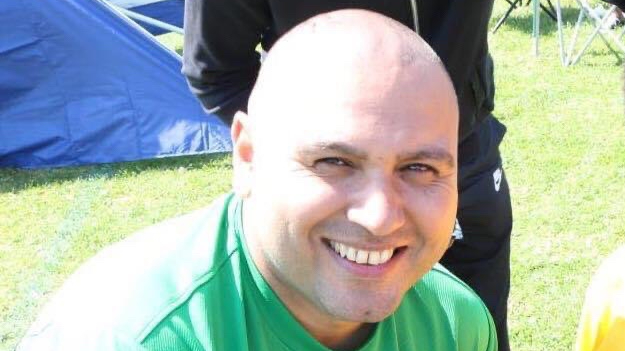Paul Kirton was once a youngster who was passionate about the beautiful game from the grassroots level. Now, he’s the managing director at the nations leading organisation for grassroots football. His career has included hard-work, determination, resilience and passion which he decodes for you in this weeks interview.
Q1) Paul, it’s a pleasure to have you on Ash’s Sports Talk. Would you mind kicking this off by sharing how your sports career began?
I didn’t have much of a sports career as a youngster. However, my passion for grassroots sports was introduced to me when I was 7-8 years old. I used to be a football coach for adult and children, which led me on a journey to set up the first-ever independent grassroots football company, Grassroots Football UK. What’s great about my role is that it embeds grassroots sport in every aspect, such as, my office is a football pitch, my uniform is a tracksuit, my laptop is a coaching van, and this is the environment where I’m most comfortable.
I’ve always loved football due to the purity of the sport. The grassroots level is the most original form of the game, which isn’t the same at the game’s elite class. Nothing gives me more satisfaction than watching football at the grassroots level for this reason.
Q2) I’d love to visit your position at Show Racism the Red Card. What inspired you them, and what is the organisation trying to achieve?
Show Racism the Red Card are an anti-racism organisation to give football higher prominence, and the organisation has been established for decades. They’re involved in lots of educational work, and once I found out what they do and how they do their job, it was impossible not to be involved. Considering my experience working with diversity and inclusion as a former coach, I became the company’s patron, and I loved it. I’m responsible for guiding the organisation on policies and efficiently reaching the grassroots sports audience.
Q3) With the unfortunate social injustice football has experienced for several years, what positives have you seen the game make? Plus, what more do you believe needs to be done to alleviate the game into a more equal and diverse industry?
The positives have included people doing what others see. While I was a child, I watched Match of the Day, and I saw John Barnes, who looked like me, and I automatically wanted to be him. This made the experience when I was playing more believable that I was John Barnes. The game has made significant strides to bring more diverse communities into the game. Including black players as seeing players like Raheem Sterling and Wilfred Zaha grace Premier League soil is bound to inspire many from the next generation.
Unfortunately, I haven’t seen the same growth in the Asian community. There are certainly opportunities to grow the Asian game if you can effectively remove the barriers. Grassroots Football UK set up some projects and travelled to Kingston upon Thames and met some 70-80-year-old South Asian ladies to identify why football wasn’t involved in their lives. They answered that they feared participating due to their backgrounds, and that felt like they’d never get given the opportunity. However, if these issues were alleviated, they’d jump at the first chance. I then decided to take these ladies to a local football game, and once they were exposed to that environment, they loved it! This demonstrated that once you openly welcome someone into an environment, it breaks down any barrier, stereotype and anyone who refuses to believe we’re all human!
Essentially, it’s been positive to see the increase in diversity achieved by reaching out to deprived communities which have come along way in the last twenty years.
Q4) Tell me more about your work at Grassroots Football UK. What does your role look like day-to-day, and what is the ambition behind the organisation?
We’re currently waiting on announcements as we had lots of plans postponed due to lockdown taking place. The grassroots game has been in flux at present. We’ve had a positive obligation to keep football moving, and the ambition is to be the number one organisation leading grassroots football.
The journey to forming Grassroots Football UK began from me organising a sponsored walk, and I had to get a sponsor form for others to sign. Still, I couldn’t find one after contacting multiple sports organisations like the County FA and football leagues. I made one myself in the end despite not being the most tech-savvy individual. I then found many other sports organisations coming to me as they were experiencing the same problem. Once I garnered more attention, I decided to formalise the sponsored event by creating a website and identity which leveraged a team and a network. Now, we have our own media arm where we make our own coaching videos, exclusive interviews with County FA’s and Leagues and much more!
I love what I do because it makes a life-changing impact. For example, a coach had a child who has three fingers, and it was challenging to find goalkeeper gloves for him. I wanted to help him, and I set off to a factory to design, create and stitch some gloves tailored for his needs. To this day, he now has them and finds it superb as it allows him to do what he does best. This proves that I don’t expect an applaud for my work; I do it because it’s the right thing.
Q5) I appreciate throughout COVID19 that grassroots football has taken the most massive deficit across the football pyramid. How has the pandemic impacted business, and what positives have you taken away from this experience?
Of course, it’s easy to blame COVID19 for the problems we’ve faced today. However, grassroots football has struggled with a lack of funding for decades, whereas COVID has had a contemporary effect on the game. A genuinely positive factor I’ve seen from the pandemic has been football clubs uniting a stronger relationship with their communities. Marcus Rashford’s free school meals campaign has helped enormously by various grassroots clubs providing similar support to their communities. Despite things being more unstable than ever, grassroots clubs were the first to jump in and support their people which showcases that we don’t do this because we have to, we do it because we want to.
Q6) You’ve achieved lots throughout your sporting career. However, as we both know, the sports industry is full of constant challenges. What are some of the most significant challenges you’ve experienced throughout your journey? Also, how have these experiences moulded you into a more resilient asset?
COVID19 has recently been the most significant challenge. I remember March 21st being a very dark day for grassroots football and society as nobody knew what would happen or come out of it. However, when we came back from the 1st lockdown, it transformed us into better coaches as we had more time to think about how we can deliver more robust session plans and best practices. COVID19 proved to be a good time for coaches to coach while parents wouldn’t have to worry about their children winning, losing or drawing. We learned how to do risk assessments during this time, such as what does a suitable risk assessment and COVID secure look like.
It’s essentially made me a resilient asset as we’ve proven to adapt well to edge closer to our goal of becoming the number one grassroots football organisation.
Q7) Paul, reflecting on this discussion and your career, what is your killer piece of advice for someone wanting to pursue a career in sport?
Never give up. If I gave up at first hurdle, I wouldn’t be here today. I remember coming up with the idea to create Grassroots Football UK; I was laughed at by everyone. If I accepted this, grassroots football wouldn’t provide educational services to thousands of coaches, teams and clubs. Plus, don’t always listen to others and trust your gut.
Incredible! What a superb interview with Paul. His journey may be an unorthodox one, but it worked out to provide an invaluable service to ensure grassroots football gets as much resource as possible to continue making an impact throughout the entire football pyramid. The essential learnings I’ve taken away from Paul’s career include always going with your gut, champion a cause that’s close to your heart and never ever give up!


nice interview; had to do some reading up on what grassroots football is; I hope it comes back strong from the lockdowns…
LikeLiked by 1 person
Happy new year, Jim! I hope so too! It’s the heart of the game.
LikeLiked by 1 person
I am a big fan of amateur sports…
LikeLike